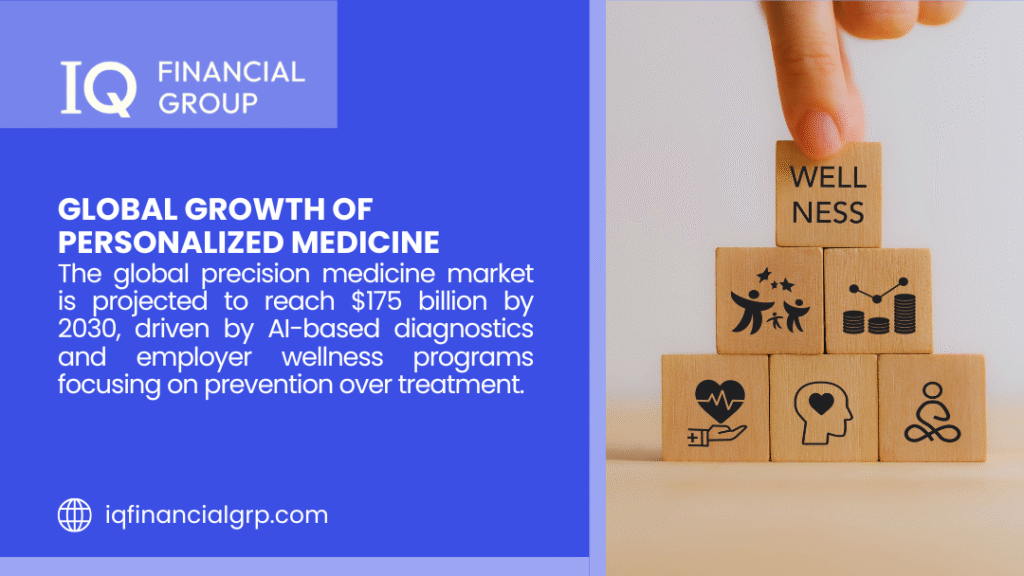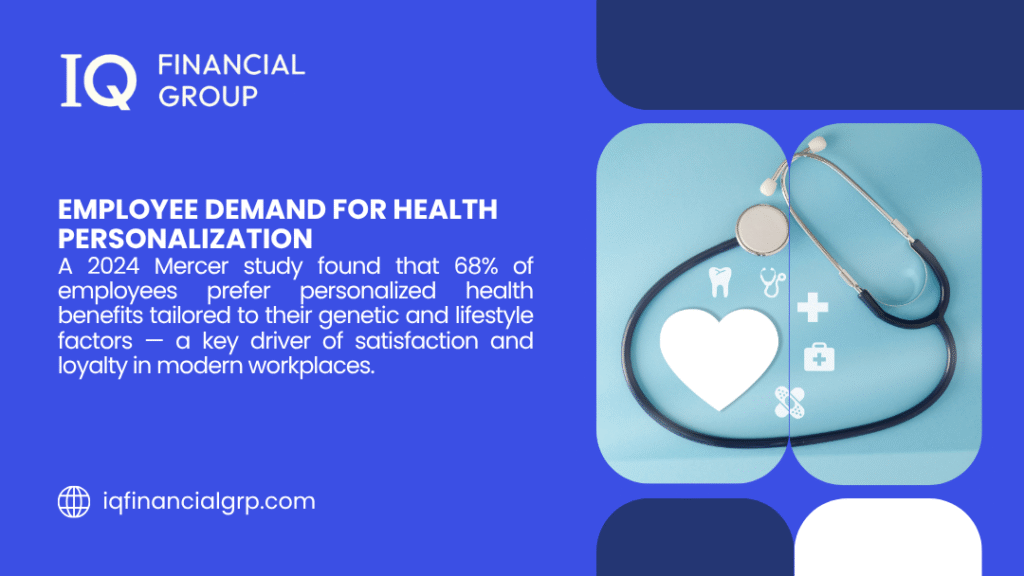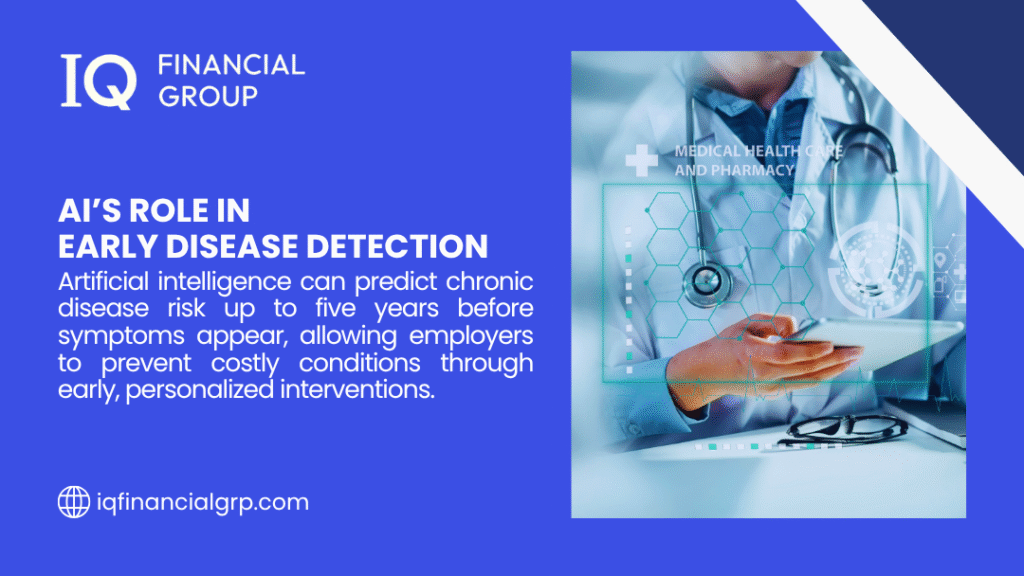Personalized medicine, also known as precision medicine, uses individual health data, genetics, and lifestyle information to guide diagnosis, prevention, and treatment. Benefits of personalized medicine for employees, integrating this approach into workplace health programs can lead to improved employee well-being, lower healthcare costs, and enhanced productivity.
For employees, personalized medicine means receiving care that fits their unique health profile rather than relying on a “one-size-fits-all model.” This article explores the practical, medical, and organizational advantages of personalized healthcare in employee benefit programs.
The Problem with Traditional Healthcare Models
In 2024, U.S. employers lost an estimated $225 billion in productivity, not primarily because healthcare is costly, but because the system is reactive. Traditional health plans intervene only after illness develops: after diabetes has progressed, after a heart condition has appeared, or after a preventable issue has escalated into a major claim, long-term disability, or employee burnout.
This reactive design is the fundamental flaw of conventional coverage. It focuses on treatment, not prevention, addressing medical problems after they’ve already reduced productivity and inflated claims.
The Shift Toward Preventative, Preventive Care
Forward-thinking organizations are now redefining their approach to employee health. Instead of waiting for conditions to emerge, they are adopting AI-powered, data-driven personalized medicine programs that identify risks months or even years before symptoms occur. These initiatives leverage genetics, biomarkers, and real-time health data to anticipate and prevent disease rather than simply reimbursing for it.
This marks a profound shift in corporate healthcare strategy: from reactive cost management to proactive health optimization. Employers who adopt personalized medicine are no longer just paying medical bills, they’re preventing them by tackling the root causes of chronic illness before they affect productivity. By reducing the number of claims submitted to traditional employer healthcare plans, personalized programs also help control long-term insurance costs, supporting a more sustainable benefits of personalized medicine for employees.
Personalized medicine is no longer a healthcare trend; it’s a strategic business advantage, helping companies protect their most valuable asset: their people.
Why Personalized Medicine Matters in the Workplace
Modern workplaces are becoming increasingly health-focused. Employers recognize that healthy employees are not only happier but also more productive. Traditional health insurance models often rely on standardized plans, a “one-size-fits-all” approach. However, every employee’s health risks, genetics, and lifestyle are different.
Personalized medicine bridges this gap. It uses advanced tools, including artificial intelligence, genomic testing, and Preventative analytics, to tailor healthcare strategies to each individual. This shift benefits both employers and employees, ensuring medical care that is preventive, data-driven, and cost-efficient.
What Is Personalized Medicine?
Personalized medicine (also called precision medicine) is a healthcare approach that customizes diagnosis and treatment to the individual characteristics of each patient. It considers genetics, environment, and lifestyle factors to predict disease risk and identify the most effective treatments with the fewest side effects.
According to the National Institutes of Health (NIH), precision medicine aims to “deliver the right treatment to the right patient at the right time.”
In workplace health programs, personalized medicine can include customized wellness plans and targeted preventive measures that support healthier outcomes for employees..

Comparison of Traditional vs Personalized Healthcare
| Feature | Traditional Healthcare | Personalized Medicine Approach | Benefits for Employees & Employers |
| Risk Assessment | Generalized, population-based | Individualized based on genetics and lifestyle | Early identification of high-risk employees; preventive interventions |
| Treatment | Standard protocols | Tailored treatments based on personal data | Fewer side effects, improved adherence, better outcomes |
| Preventive Care | Limited screening | Preventative and proactive screenings | Reduced chronic disease incidence and long-term costs |
| Employee Engagement | Passive participation | Active participation in personalized programs | Higher satisfaction and motivation to maintain health |
| Cost Efficiency | Late intervention that increases hospital claims and healthcare costs. | Preventive and precision-driven care | Lower long-term healthcare costs for the employer and employee |
This table demonstrates how personalized medicine shifts care from reactive to proactive, ultimately benefiting both employees and employers.
How Benefits of Personalized Medicine for Employees is Important?
1. Improved Health Outcomes
Benefits of personalized medicine for employees works when their medical care reflects their unique biology and lifestyle. Personalized medicine helps doctors make more accurate diagnoses and select treatments that work best for each individual.
For example:
- Genetic testing can identify employees at high risk for chronic conditions like diabetes, heart disease, or cancer.
- Early intervention programs can then be implemented through the employer’s health plan.
This proactive approach not only improves long-term health but also reduces medical emergencies and absenteeism.
2. Reduced Side Effects and Better Treatment Adherence
Traditional medications and treatments often lead to variable results. Personalized medicine uses data from genetic testing and clinical research to predict how each person will respond to specific treatments. This minimizes side effects and improves treatment success rates.
For employees managing chronic conditions, fewer complications mean less time away from work and a higher overall quality of life.
3. Lower Healthcare Costs for Employers and Employees
Benefits of personalized medicine for employees offers a sustainable path to reducing healthcare expenses while improving coverage quality. By leveraging genetic insights, biomarker analysis, and data-driven prevention strategies, employers can identify potential health risks early, avoiding costly hospitalizations and emergency care.
| Cost Factor | Traditional Model | Personalized Model |
| Claim Frequency | High due to delayed detection and reactive treatment | Lower through continuous monitoring and early intervention |
| Cost per Claim | Elevated by unmanaged chronic conditions | Reduced through preventive management and precision prescribing |
| Program ROI | Difficult to measure and reactive | Preventative and supported by measurable data |
| Long-Term Savings | Variable and dependent on claims trends | Steady, compounding savings over multiple plan years |
Employers can amplify these savings by structuring Group Health Insurance plans around prevention and chronic disease management rather than acute care. Integrating Health Savings Accounts supports smarter healthcare spending, enabling employees to use pre-tax funds for personalized testing and early interventions.
4. Increased Employee Satisfaction and Retention
Benefits of personalized medicine for employees appreciate healthcare programs that recognize their unique needs. Personalized medicine meets this expectation by aligning prevention and treatment with each individual’s biology and lifestyle. When employers integrate this approach, it signals genuine care for employee well-being, strengthening trust and engagement across the organization.
| Factor | Personalized Medicine Impact | Long-Term Benefit |
| Health Confidence | Employees should better understand their personal risk factors and how to manage them effectively | Greater self-management and consistent wellness participation |
| Satisfaction | Access to tailored health information and precision care options enhances confidence in employer-provided benefits | Improved morale and a stronger sense of organizational support |
| Productivity | Early interventions reduce sick days and improve focus and energy | Sustainable performance and workforce stability |
Integrating personalized care transforms the workplace from reactive to proactive. When employees see that their health is managed individually rather than through a one-size-fits-all model, they feel valued and supported.
Employers that adopt benefits of personalized medicine for employees demonstrate forward-thinking leadership and a commitment to long-term employee well-being. This approach promotes a healthier culture, reduces turnover, and reinforces the company’s position as an employer of choice and also helps in benefits of personalized medicine for employees.
Organizations can strengthen these efforts through Personalized Health Insurance for Employees offered by IQ Financial Group, bridging clinical innovation with compassionate, employee-centered care.
5. Enhanced Management of Chronic Conditions
Chronic illnesses such as diabetes, hypertension, and cardiovascular disease remain leading causes of high healthcare costs and reduced productivity among employees. Personalized medicine is redefining how these conditions are managed by shifting the focus from treatment after diagnosis to early detection and targeted prevention.
Through genetic testing, biomarker evaluation, and AI-driven data analytics, employers can help identify individuals at elevated risk before symptoms appear and support them with tailored interventions.
| Condition | Traditional Management | Precision Medicine Approach |
| Diabetes | Addressed after glucose levels rise beyond clinical thresholds | Detects insulin resistance and metabolic risk years before onset |
| Hypertension | Managed following repeated high blood pressure readings | Uses biomarker and stress data to predict and prevent elevation |
| Cardiovascular Disease | Treated after acute cardiac events occur | Identifies vascular inflammation and early arterial changes |
This Preventative framework enables organizations to transition from reactive care to proactive health management. Once high-risk employees are identified, personalized wellness plans, including nutrition guidance, exercise recommendations, and precision medication management, can be implemented to stabilize health before complications arise.
Employers integrating these insights into their benefit structures not only reduce hospitalization and claims costs but also enhance workforce vitality and retention. Companies seeking to strengthen ongoing care coverage can complement these strategies with Supplemental Plans, ensuring comprehensive support for preventive and chronic care needs.

Implementation Framework for Employers
| Step | Description | Tools / Resources |
| Needs Assessment | Evaluate employee demographics, health risks, and current benefits | Health risk assessments, employee surveys |
| Program Design | Develop personalized healthcare strategies | Custom insurance plans, wellness programs, and digital health platforms |
| Data Integration | Collect and analyze employee health data | HIPAA-compliant platforms, wearable devices, and electronic health records |
| Preventive Initiatives | Implement screenings and lifestyle interventions | Health coaching, genetic testing, and AI Preventative analytics |
| Monitoring & Optimization | Track outcomes and adjust plans | Analytics dashboards, periodic health evaluations |
| Employee Education | Provide resources on personalized health | Webinars, internal communications, informational brochures |
| Review & Feedback | Evaluate program effectiveness and employee satisfaction | Surveys, focus groups, performance metrics |
This framework ensures that personalized medicine is successfully implemented while balancing cost, compliance, and employee engagement.
The Role of Data and Artificial Intelligence in Personalized Medicine
Data aggregation and artificial intelligence (AI) are central to delivering scalable personalized care. By securely combining genetic profiles, biomarker results, electronic health records, and wearable metrics, AI systems detect patterns that enable earlier risk identification and more precise treatment planning in benefits of personalized medicine for employees.
These analytical insights let clinicians recommend interventions grounded in evidence and allow employers to design benefit programs that target prevention and long-term health improvement.
| Application | What It Does | Employer & Clinical Benefit |
| Preventative analytics | Analyzes historical and real-time health data to identify individuals at elevated risk | Triggers timely preventive programs and targeted screenings |
| Treatment matching | Maps genetic and metabolic markers to optimal therapies | Improves efficacy, reduces adverse reactions, and medication waste |
| Health trend monitoring | Processes continuous wearable and biometric data to track wellness over time | Supports adherence, early course correction, and outcome measurement |
| ROI modeling | Simulates cost and utilization impacts of preventive strategies | Quantifies expected savings and guides benefits investment decisions |
Safeguarding privacy and meeting regulatory requirements are nonnegotiable. Programs should use de-identified population data for trend analysis, encrypt personal data in transit and at rest, and require explicit employee consent for any identifiable data usage.
Employers implementing precision health solutions are advised to partner with experienced brokers and HIPAA-compliant vendors; these partners help translate clinical capabilities into compliant plan designs that align with organizational goals. For professional support in selecting and integrating appropriate vendors, consider consulting trusted Health Insurance Brokers.
Clinical and Organizational Evidence for benefits of personalized medicine for employees
Extensive clinical research and employer experience confirm that personalized medicine delivers measurable improvements in both health outcomes and cost management. Scientific studies validate the medical efficacy of this approach, while real-world implementation shows tangible benefits for organizations and their employees.
| Source | Key Findings | Employer Implications |
| Journal of Precision Medicine (2023) | Personalized risk modeling reduced cardiovascular incidents by 25% | Demonstrates quantifiable prevention value and lower claim costs |
| NIH All of Us Program | Genetic analysis improved treatment accuracy for metabolic disorders | Enhances wellness program precision and employee engagement |
| Mayo Clinic Report | Early biomarker testing decreased hospitalization rates by 18% | Confirms cost efficiency and productivity protection through prevention |
Employers that have successfully implemented personalized medicine initiatives report parallel outcomes: lower healthcare spending, higher employee satisfaction, and fewer long-term disability claims. Integrating these strategies with Disability Insurance helps employees maintain income stability during medical recovery, while the organization benefits from reduced absenteeism and improved retention.
Together, the research evidence and practical results validate personalized medicine as a clinically credible and financially sustainable model for modern workforce health management.
Challenges and Ethical Considerations
While the benefits of personalized medicine are substantial, certain challenges must be managed responsibly:
- Data privacy: Employers must ensure compliance with HIPAA and other data protection laws.
- Accessibility: Precision medicine technologies must be equitable and available to all employees.
- Cost: Initial implementation may require investment, though savings often offset these over time.
Ethical management of genetic and personal health information is crucial to maintaining trust and transparency between employers and employees.

Future of Personalized Medicine in Workplace Healthcare
As precision medicine becomes more affordable and accessible, it is expected to become a cornerstone of employer health strategies. AI-driven diagnostics, Preventative analytics, and wearable health monitors will redefine how employee wellness programs are designed.
Organizations investing early in this approach to healthcare will gain long-term advantages in productivity, retention, and workforce well-being. Businesses in growth regions can consult a local Insurance Broker in San Francisco for tailored solutions.
Key Takeaways
| Key Point | Summary |
| What is Personalized Medicine? | Delivers individualized care based on genetic, environmental, and lifestyle factors. |
| Employer Benefits | Lower healthcare costs, higher employee satisfaction, and improved productivity. |
| Benefits of personalized medicine for employees | More accurate diagnosis, preventive care, and reduced treatment side effects. |
| Important Consideration | Ethical implementation and strong data security are critical. |
| Why Partner with Experts | Working with experienced professionals like IQ Financial Group ensures compliant and cost-effective healthcare solutions. |
Conclusion
Benefits of personalized medicine for employees represents a transformative opportunity for both employees and employers. By moving beyond a “one-size-fits-all” approach, organizations can improve individual health outcomes, reduce long-term healthcare costs, and foster a more engaged and satisfied workforce.
IQ Financial Group, with over two decades of experience, provides expert guidance to design and implement personalized health insurance and employee wellness strategies. From individual and family health insurance to group plans, disability coverage, and supplemental services, their client-centered approach ensures that employees receive coverage tailored to their unique needs.
Investing in personalized employee benefits is not just a medical decision; it is a strategic business decision. Companies that embrace this model demonstrate a commitment to employee well-being while safeguarding organizational productivity and sustainability.
To explore personalized healthcare solutions for your workforce, visit IQ Financial Group and discover tailored insurance plans designed to meet the diverse needs of your employees.

